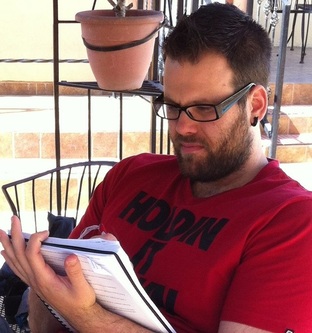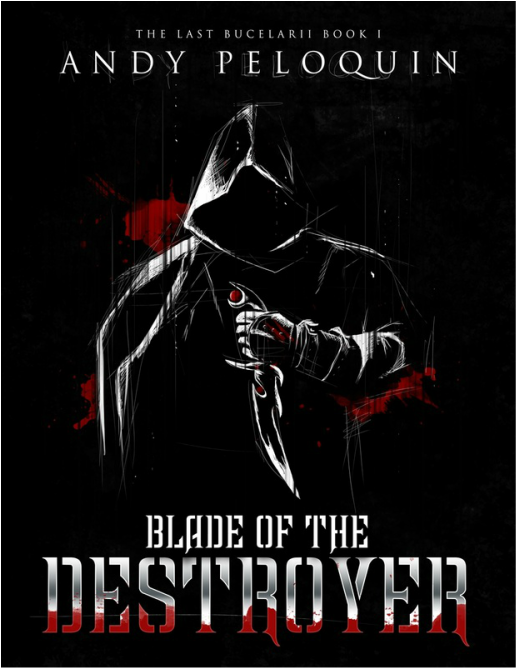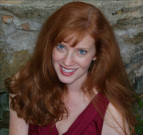From the first words on the page this fantasy holds the reader spellbound even after the book is finished…his character is very well-defined even if his past is a mystery. Root for an assassin? Oh, yes, one must! -- Carol Conley, for InDTale Magazine
A faceless, nameless assassin. A forgotten past. The Hunter of Voramis--a killer devoid of morals, or something else altogether? (Blade of the Destroyer--dark fantasy with a look at the underside of human nature)
WELCOME Andy Peloquin! I'm excited to be a tour stop today for Andy's new book, Blade of the Destroyer. Here's his guest article on DARK FANTASY:
The Three Key Ingredients to Dark Fantasy
by Andy Peloquin
What is needed for a dark fantasy novel? What sets dark fantasy apart from all the other fantasy genres?
Here are a few key ingredients that qualify a book for “dark” status:
1. Darker themes of fantasy – It’s not just the quest of the hero or the epic journey to save the world, but you’ve got to include something a bit darker. Think death, murder, mayhem, and horrors inflicted upon people.
2. Horror elements -- Monsters like vampires, werewolves, Lovecraftian deities, mythological creatures, and demons are all common elements of dark fantasy stories. Dark fantasy usually combines elements of horror with fantasy story lines.
3. A dark, gloomy ambience/sense of dread -- If most of the story is filled with horror, death, brooding, and an overall pall of gloom, it’s a dark fantasy story. There’s very little happiness or joy in a dark fantasy world--and any bright moments are quickly overshadowed by suffering.
Why in the heck would anyone want to write in this depressing genre? It’s all horror and terror, so what’s the fun in that?
Well, for some us (such as myself), dark fantasy is the PERFECT genre to explore the darker side of human nature, but with a fantasy twist. For example, if I were to write a novel about a serial killer, it would be a thriller novel. But if I make the serial killer a monster or set the story in a fantasy world, it’s “dark fantasy.”
I’m a fantasy lover at heart, and I love telling stories set in a world I create. Being able to write my own worlds is a huge part of what makes fantasy my genre of choice. But instead of finding the “good” or the “happy” in these worlds, it’s much more enjoyable to explore the underbelly.
There are too many stories filled with heroes, heroines, and people doing good things for good reasons! We need a few more bastards, killers, and monsters that we can read and enjoy. It’s much more challenging to make an audience root for a serial killer than for “the hero.” That is a challenge that I love to take on, which is why I love dark fantasy.
Here are a few key ingredients that qualify a book for “dark” status:
1. Darker themes of fantasy – It’s not just the quest of the hero or the epic journey to save the world, but you’ve got to include something a bit darker. Think death, murder, mayhem, and horrors inflicted upon people.
2. Horror elements -- Monsters like vampires, werewolves, Lovecraftian deities, mythological creatures, and demons are all common elements of dark fantasy stories. Dark fantasy usually combines elements of horror with fantasy story lines.
3. A dark, gloomy ambience/sense of dread -- If most of the story is filled with horror, death, brooding, and an overall pall of gloom, it’s a dark fantasy story. There’s very little happiness or joy in a dark fantasy world--and any bright moments are quickly overshadowed by suffering.
Why in the heck would anyone want to write in this depressing genre? It’s all horror and terror, so what’s the fun in that?
Well, for some us (such as myself), dark fantasy is the PERFECT genre to explore the darker side of human nature, but with a fantasy twist. For example, if I were to write a novel about a serial killer, it would be a thriller novel. But if I make the serial killer a monster or set the story in a fantasy world, it’s “dark fantasy.”
I’m a fantasy lover at heart, and I love telling stories set in a world I create. Being able to write my own worlds is a huge part of what makes fantasy my genre of choice. But instead of finding the “good” or the “happy” in these worlds, it’s much more enjoyable to explore the underbelly.
There are too many stories filled with heroes, heroines, and people doing good things for good reasons! We need a few more bastards, killers, and monsters that we can read and enjoy. It’s much more challenging to make an audience root for a serial killer than for “the hero.” That is a challenge that I love to take on, which is why I love dark fantasy.
Book Blurb
The Last Bucelarii (Book 1): Blade of the Destroyer
The Hunter of Voramis is the perfect assassin: ruthless, unrelenting, immortal. Yet he is haunted by lost memories, bonded to a cursed dagger that feeds him power yet denies him peace of mind. Within him rages an unquenchable need for blood and death.
When he accepts a contract to avenge the stolen innocence of a girl, the Hunter becomes the prey. The death of a seemingly random target sends him hurtling toward destruction, yet could his path also lead to the truth of his buried past?
The Hunter of Voramis is the perfect assassin: ruthless, unrelenting, immortal. Yet he is haunted by lost memories, bonded to a cursed dagger that feeds him power yet denies him peace of mind. Within him rages an unquenchable need for blood and death.
When he accepts a contract to avenge the stolen innocence of a girl, the Hunter becomes the prey. The death of a seemingly random target sends him hurtling toward destruction, yet could his path also lead to the truth of his buried past?
Buy Links
Amazon Kindle: http://www.amazon.com/Blade-Destroyer-Last-Bucelarii-Book-ebook/dp/B012EI9M4A/
Amazon Paperback: http://www.amazon.com/Blade-Destroyer-Last-Bucelarii-Book/dp/1515038955/
Goodreads: https://www.goodreads.com/book/show/25269614-blade-of-the-destroyer
Amazon Paperback: http://www.amazon.com/Blade-Destroyer-Last-Bucelarii-Book/dp/1515038955/
Goodreads: https://www.goodreads.com/book/show/25269614-blade-of-the-destroyer
Interview
1. Tell us about your main character, the Hunter of Voramis -- The Hunter is an assassin, so he’s not a “happy” person. He’s a killer by nature, and he literally has a voice in his head that compels him to kill. Yet there are things that you can't help but like about him: he’s a protector, he cares about a select people, he’s as flawed as you or I.
2. What is your mission for this series (number of books, any nuggets about characters we will see in future books)? -- I want to evolve the Hunter as a character. He will never be “good” and there will never be a “happy ending” to his story, but there will be an ending that will make you feel “yes, that's the right end to this.” There will either be five or six books total (I have up to Book 3 written), depending on how much story there is to tell.
3. Favorite part of writing this story/least favorite part -- My most and least favorite part of writing is hearing back from beta readers. While writing this book, I thought I was doing good. After getting feedback, I ended up re-writing a third! It’s a lot of work and a challenge to incorporate, but it makes the writing MUCH better.
4. Mentors/authors who have inspired your writing. What are you reading now? -- I respect Brandon Sanderson’s writings, stories, and characters, so I’m going through all of his books. I’m currently working on the Mistborn series, but I’ll drop everything the moment his next Stormlight Archive book is released.
5. Your journey as a writer -- how did it begin, where has it taken you? -- I’d have to say that it started thanks to two individuals. One is my brother-in-law, who started writing fiction a few months before I did. Seeing him do that made me think, “Well, if he can, I can, too!” The other is a distant relative of mine who read something I wrote and wanted to publish it in a comic book series. The fact that she (a successful writer in her own right) saw value in my writing boosted my confidence and told me that I could create.
6. Future projects? Will you stay in this genre or branch out? -- I plan to stick with dark fantasy for the time being. I know it’s not as widely accepted as YA fiction, epic fantasy, or thrillers, but it allows me to tell the dark, twisted stories I want to tell. I have many more stories about assassins, thieves, dark cults, and other terrible things.
7. Plotter or Panster? -- A bit of both, actually. I usually have things fairly well plotted out before I start writing. I’ll take a week or so to plot out at least the first half of the book before I sit down to write. As I write, I come up with new twists, angles, and elements of the book. I figure things out as I go, but I have a lot figured out before I write. It helps me to avoid the dreaded writer’s block.
8. Has your process changed from your debut novel, In the Days: A Tale of the Forgotten Continent? -- Absolutely! I wrote, edited, and released In the Days in about two months. It was a ton of fun and it got me out there, but I have come to see the value of taking my time. I’ve invested more time in beta readers, getting feedback, and carefully going over my work. I’m a perfectionist by nature, and this has allowed me to make my work as close to “perfect” as I can.
9. Things you wish you knew when you started out? -- I wish I knew how much work this was going to be, and how much time it would take! I haven’t gone out partying in nearly two years (though I don’t miss it), and I haven’t had a Saturday morning off in about that much time. Vacation is usually a few extra hours of writing, and not all of it is fun.
10. Movie deal: dream cast for your story -- That’s a tough call! I’d love an actor who has a Jason Statham level of bad-assery, but with more refinement and much more hair. I'd love to have Benedict Cumberbatch as the villain!
2. What is your mission for this series (number of books, any nuggets about characters we will see in future books)? -- I want to evolve the Hunter as a character. He will never be “good” and there will never be a “happy ending” to his story, but there will be an ending that will make you feel “yes, that's the right end to this.” There will either be five or six books total (I have up to Book 3 written), depending on how much story there is to tell.
3. Favorite part of writing this story/least favorite part -- My most and least favorite part of writing is hearing back from beta readers. While writing this book, I thought I was doing good. After getting feedback, I ended up re-writing a third! It’s a lot of work and a challenge to incorporate, but it makes the writing MUCH better.
4. Mentors/authors who have inspired your writing. What are you reading now? -- I respect Brandon Sanderson’s writings, stories, and characters, so I’m going through all of his books. I’m currently working on the Mistborn series, but I’ll drop everything the moment his next Stormlight Archive book is released.
5. Your journey as a writer -- how did it begin, where has it taken you? -- I’d have to say that it started thanks to two individuals. One is my brother-in-law, who started writing fiction a few months before I did. Seeing him do that made me think, “Well, if he can, I can, too!” The other is a distant relative of mine who read something I wrote and wanted to publish it in a comic book series. The fact that she (a successful writer in her own right) saw value in my writing boosted my confidence and told me that I could create.
6. Future projects? Will you stay in this genre or branch out? -- I plan to stick with dark fantasy for the time being. I know it’s not as widely accepted as YA fiction, epic fantasy, or thrillers, but it allows me to tell the dark, twisted stories I want to tell. I have many more stories about assassins, thieves, dark cults, and other terrible things.
7. Plotter or Panster? -- A bit of both, actually. I usually have things fairly well plotted out before I start writing. I’ll take a week or so to plot out at least the first half of the book before I sit down to write. As I write, I come up with new twists, angles, and elements of the book. I figure things out as I go, but I have a lot figured out before I write. It helps me to avoid the dreaded writer’s block.
8. Has your process changed from your debut novel, In the Days: A Tale of the Forgotten Continent? -- Absolutely! I wrote, edited, and released In the Days in about two months. It was a ton of fun and it got me out there, but I have come to see the value of taking my time. I’ve invested more time in beta readers, getting feedback, and carefully going over my work. I’m a perfectionist by nature, and this has allowed me to make my work as close to “perfect” as I can.
9. Things you wish you knew when you started out? -- I wish I knew how much work this was going to be, and how much time it would take! I haven’t gone out partying in nearly two years (though I don’t miss it), and I haven’t had a Saturday morning off in about that much time. Vacation is usually a few extra hours of writing, and not all of it is fun.
10. Movie deal: dream cast for your story -- That’s a tough call! I’d love an actor who has a Jason Statham level of bad-assery, but with more refinement and much more hair. I'd love to have Benedict Cumberbatch as the villain!
Author Bio
 Andy Peloquin: Lover of All Things Dark and Mysterious
Andy Peloquin: Lover of All Things Dark and Mysterious Andy Peloquin--a third culture kid to the core -- has loved to read since before he could remember. Sherlock Holmes, the Phantom of the Opera, and Father Brown are just a few of the books that ensnared his imagination as a child.
When he discovered science fiction and fantasy through the pages of writers like Edgar Rice Burroughs, J.R.R Tolkien, and Orson Scott Card, he was immediately hooked and hasn't looked back since.
Andy's first attempt at writing produced In the Days: A Tale of the Forgotten Continent. He has learned from the mistakes he made and used the experience to produce Blade of the Destroyer, a book of which he is very proud.
Reading -- and now writing -- is his favorite escape, and it provides him an outlet for his innate creativity. He is an artist; words are his palette.
His website (http://www.andypeloquin.com) is a second home for him, a place where he can post his thoughts and feelings--along with reviews of books he finds laying around the internet.
He can also be found on his social media pages, such as:
Twitter: https://twitter.com/AndyPeloquin
Facebook: https://www.facebook.com/andyqpeloquin
www.linkedin.com/in/andypeloquin/
https://plus.google.com/100885994638914122147/about
https://www.amazon.com/author/andypeloquin
https://www.facebook.com/andrew.peloquin.1
10 Things You Need to Know About Me:
When he discovered science fiction and fantasy through the pages of writers like Edgar Rice Burroughs, J.R.R Tolkien, and Orson Scott Card, he was immediately hooked and hasn't looked back since.
Andy's first attempt at writing produced In the Days: A Tale of the Forgotten Continent. He has learned from the mistakes he made and used the experience to produce Blade of the Destroyer, a book of which he is very proud.
Reading -- and now writing -- is his favorite escape, and it provides him an outlet for his innate creativity. He is an artist; words are his palette.
His website (http://www.andypeloquin.com) is a second home for him, a place where he can post his thoughts and feelings--along with reviews of books he finds laying around the internet.
He can also be found on his social media pages, such as:
Twitter: https://twitter.com/AndyPeloquin
Facebook: https://www.facebook.com/andyqpeloquin
www.linkedin.com/in/andypeloquin/
https://plus.google.com/100885994638914122147/about
https://www.amazon.com/author/andypeloquin
https://www.facebook.com/andrew.peloquin.1
10 Things You Need to Know About Me:
- Hot wings, ALWAYS!
- I never forget a face, but rarely remember a name.
- I'm a head taller than the average person (I'm 6' 6")
- Marvel > DC
- I was born in Japan, and lived there until the age of 14.
- Selena Gomez and Five Finger Death Punch are both in my playlist.
- Aliens are real, but it's self-centered of us to believe that they would come to visit Earth.
- Watching sports: suck. Playing sports: EPIC!
- I earned a purple belt in Karate/Hapkido/Taekwondo.
- I dislike most Christmas music, aside from Trans-Siberian Orchestra.


 RSS Feed
RSS Feed